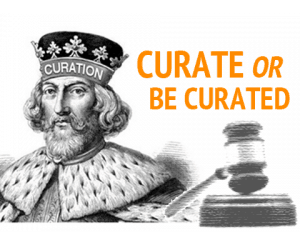 Curation is fundamental to how we process messages in the world. There is simply just too much information to process without filtering it for content and quality. Curating it. We curate all over the place. Social networks are among the most well-known of curation tools. That is coming under some threat, however.
Curation is fundamental to how we process messages in the world. There is simply just too much information to process without filtering it for content and quality. Curating it. We curate all over the place. Social networks are among the most well-known of curation tools. That is coming under some threat, however.
Twitter is now even threatening to curate our curation. Please don’t do it, Dick. Don’t turn other social networks into Facebooks. Facebook has its robot-fed feeds and everyone loves/hates them. Please don’t ruin Twitter with that schwack, Dick. Let us keep Twitter what we want it to be. Please. True curation is the art of usability. </rant>
Let’s go waaay back to the beginning, shall we?
Social curation of the Web
In the beginning of the Web, many of us created webpages. Many more, however, recoiled from such freedom. As algorithms matured (ie PageRank, et al), mere fluency in HTML & CSS could not guarantee our user-generated pages would retain relevancy or be easily found as such virtual real estate began popping up in exponential growth ratios. New sciences, such as SEO suddenly came to be new fluencies required to maintain relevancy as the online world evolved faster than it could be studied.
This is exactly how Facebook, LinkedIn, Tumblr, and other pre-fab platforms took hold in the first place even amidst privacy and IP concerns. It was easy for the average bear to quickly see their name up in lights.
Point is: given a choice of social freedom or curation, the herd chooses curation, so now we’re dealing with the ripple effects of those choices. Could it have been better? Sure. But it’s not all bad.
Curation or Criticism?
An interesting comparison is the beginning of the music industry. We (fans) actually paid for albums. We had to be mindful of our choices because there was overhead. “Music critics” emerged as publications saw opportunity to influence purchasing decisions. At the time, how something sounded on our own systems was part of the magic, unless we just happened to hear it on the radio or at a record store. Now, we can discover how anything sounds in mere seconds, via YouTube, Spotify, Pandora, etc. Curation effectively neutralized the music critic. That any blogs mention an album at all is more important than what is written about it. We can download, listen, and decide for ourselves.
Publication vs. Filtration.
Before the Web as we know it at the moment, we typically got news from one or two publications, completely closed systems, typically tuned in to a single culture, devoid of diversity of perspective. When newspapers began to die and the content went online, another new word, aggregation, came into play. This allowed for sources to be more distributed and, arguably, somewhat more egalitarian.
 By now, any search on current events typically reveals thousands of articles on the same topic. The sheer number of reports on a current, happening event skyrockets. Curation of that aggregated data is crucial in order to find value in any of it. Without filtering to find the relevant, true and/or interesting bits, readers whose days are dedicated to other matters would have to manage that on their own in addition to all the other schwack they gotta do.
By now, any search on current events typically reveals thousands of articles on the same topic. The sheer number of reports on a current, happening event skyrockets. Curation of that aggregated data is crucial in order to find value in any of it. Without filtering to find the relevant, true and/or interesting bits, readers whose days are dedicated to other matters would have to manage that on their own in addition to all the other schwack they gotta do.
Original reporting is still as important as it was before — perhaps even more so, because being “patient zero” on a story is a great way to get everyone else to link back to you.
Consumption devices curate functionality.
Finally, we arrive at the sort of curation Sarah Rotman Epps talks about. The Kindle, cellphone, MP3 player, GPS, and other purpose-specific devices curate functionality in order to deliver a better experience than a general-purpose desktop or laptop computer ever could. This holds especially true for devices designed around consumption, such as big-screen televisions. For example, iPads are merely recent tools designed to curate content on a personal level. Is it still curation? Tough question. Even before them, we could read any link later using Instapaper, or from a Twitter account, or ancient RSS feeds (some of the earliest forms of curation), which could then be read on whatever device we choose.
Content on tablets, by design, are generally curated via their relative manufacturer “stores” like the App Store, which has specific criteria, quality standards, etc, before apps and content of any kind are allowed in. As such, Apple initially took curation a bit further, following a model of integrated experience, retaining more control over the content available to the device in the name of optimal user experience. This is a fierce debate, while other companies have little or no scruples regarding what they allow into and onto their devices. This sort of culture continues to unfold but the battles of taste will surely never be won.
In light of all this, it is worth pointing out something: non-curated computing will never cease to exist. Just because we can make a Facebook page, a Tumblr blog, and countless lists on Pinterest doesn’t mean we can’t still create and post to our own website, silo’d off somewhere in the deep Web where algorithms and search strategies are irrelevant, useless things, incapable of finding such hidden gems. There is something quite comforting and mythical in that. Like finding a cool rock on the edge of the sea, worn smooth from years of being present but only just found to be admired by someone walking alone on the beach at dawn who, upon putting it in their pocket, assigns a value intrinsic only to their own, secret economy.
So, what’s my point? This: algorithms, app stores, etc. are nifty and all but real curation is the true art of Web usability. Want to get good at it? Find someone who is great at search and finding the best schwack on the Internet and watch how they do it. Humans are still better at it than machines. So far, so good.